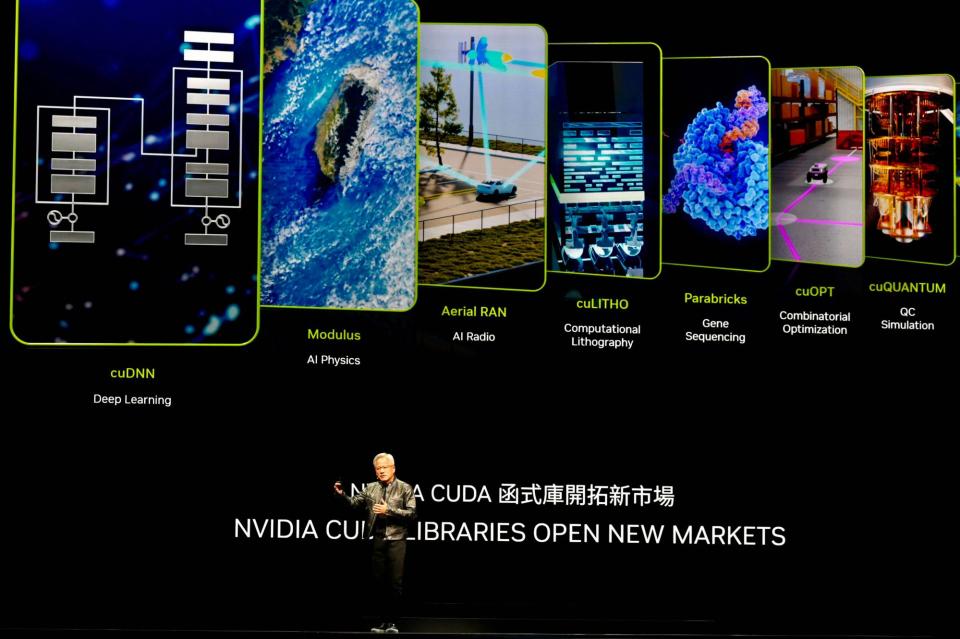An era of robotics, 'AI factories' powered by Nvidia's chips and software is 'in our near future', CEO Jensen Huang says
Nvidia founder and chief executive Jensen Huang on Sunday unveiled his vision for a new era of generative artificial intelligence (AI) and robotics for industries, powered by the chips, software and other advanced solutions from the company and its various hi-tech partners.
In a keynote speech ahead of this year's Computex trade show in Taiwan from June 4 to 7, the 61-year-old Huang said computers are "no longer just an instrument for information storage or data processing, but a factory for generating intelligence for every industry".
"We started with accelerated computing, and now, an industrial revolution," he said. "Your computer [will not just] be a tool that you use. The computer will now generate skill. This is in our near future."
Do you have questions about the biggest topics and trends from around the world? Get the answers with SCMP Knowledge, our new platform of curated content with explainers, FAQs, analyses and infographics brought to you by our award-winning team.
Nvidia products such as its Blackwell graphics processing unit (GPU) and software framework called CUDA - for Compute Unified Device Architecture - were designed to provide the technical components for enterprises to establish advanced data centres called "AI factories" and developers to create high-performance AI applications for various industries, according to Huang.
Huang's keynote reflects how Nvidia - the world's most valuable semiconductor company and one of only four hi-tech firms valued at more than US$2 trillion - has emerged at the centre of the world's AI revolution.
The Santa Clara, California-based company has established a hardware and software ecosystem that forms the basis of new computers, servers and other products being deployed by the world's largest data centre operators including Amazon.com, Microsoft, Alphabet's Google.
Data centres provide the computing infrastructure where large language models and generative AI services like ChatGPT and other chatbots are being developed.
"Now we have five million developers [for CUDA] around the world," Huang said. "We serve every single industry, from healthcare, financial services, the computer industry, automotive industry - just about every major industry in the world and every field of science."
Near the conclusion of his two-hour presentation at the National Taiwan University Sports Centre in Taipei, Huang highlighted that the next step of this new era for AI is to push forward robotics.

Nvidia founder and chief executive Jensen Huang provides an update on the new markets where his company's hardware and software products are being deployed. Photo: AFP alt=Nvidia founder and chief executive Jensen Huang provides an update on the new markets where his company's hardware and software products are being deployed. Photo: AFP>
"Physical AI", according to Huang, is the next evolution that is already happening in Taiwan, where major partners like Foxconn Technology Group and Taiwan Semiconductor Manufacturing Co are among those leading the way.
Nvidia has developed a development platform called Omniverse, which will be used to train and develop AI for various robotic applications.
Huang also shared Nvidia's early experience of dealing with the supercomputing requirements of ChatGPT creator OpenAI before its chatbot spurred a worldwide AI frenzy.
"After 2012, we changed the architecture of our GPU to add tensor cores," he said. "Nobody understood it ... OpenAI, a small company in San Francisco, asked me to deliver one to them. I delivered the first DGX, the world's first AI supercomputer to OpenAI in 2016."
Huang is among a number of heads of major semiconductor companies who are expected to make presentations at Taipei's annual Computex, one of the largest information technology exhibitions in the world.
The other semiconductor industry leaders include Lisa Su of Advanced Micro Devices, Pat Gelsinger of Intel, Qualcomm's Cristiano Amon, as well as Arm Holdings chief Rene Haas.
This article originally appeared in the South China Morning Post (SCMP), the most authoritative voice reporting on China and Asia for more than a century. For more SCMP stories, please explore the SCMP app or visit the SCMP's Facebook and Twitter pages. Copyright © 2024 South China Morning Post Publishers Ltd. All rights reserved.
Copyright (c) 2024. South China Morning Post Publishers Ltd. All rights reserved.

 Yahoo Finance
Yahoo Finance 